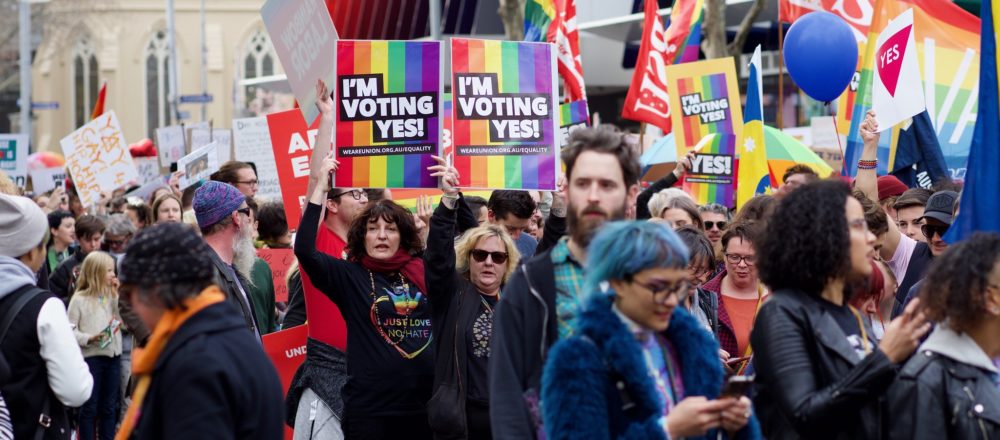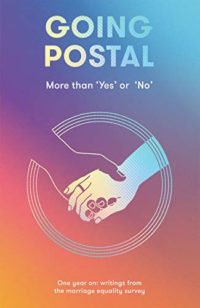Going Postal: More than ‘Yes’ or ‘No’
Edited by Quinn Eades and Son Vivienne
Brow Books
The personal is political – as I make my way through Going Postal: More than ‘Yes’ or ‘No’, this phrase haunts me. One of the latest offerings from Brow Books, it is collection of essays, creative writing and drawings released as an anniversary commemoration of Australia’s controversial same-sex marriage postal survey. The reasons this phrase has been haunting me are myriad. Initially, I believed it offered itself to me as a relevant précis for the kind of content which I expected Going Postal to cover, but as I read further and further it become apparent that the slogan didn’t go far enough. I am also increasingly persuaded that it haunts me because as I read, I am reminded that my deeply personal, deeply private identity was on the forefront on the political agenda and yet I didn’t engage with it.
I was living overseas when the postal survey was making its rounds, and aside from fending off comments about how backwards Australia was – and by fending off, I mean agreeing with – my only participation with it all was when my father mentioned that we’d received five ballot papers, one for each of my family including my not-yet-of-voting-age siblings. I laughed with him, and said he’d better just tick “Yes” for all of them, and that was that. The reason this is relevant is that the pieces which comprise Going Postal were all written or produced in the midst of the debate surrounding the survey. Reading them a year on, there is a sense of disconnect, of frustration and helplessness, which intentionally or not, mimics my experiences and more importantly, draws attention to the disconnect, the frustration and the sense of helplessness which so many in the broader LGBTQIA+ community were living through at the time. As Simon Hunt states in the foreword, “the people who chronicle fragments of their lives…in this book have no time to think about marriage but rather are navigating a dark landscape of public scrutiny and judgement of their lives within an intense, contained period.”
The impetus behind Going Postal was Quinn Eades’s series I can’t stop crying… and his pieces set the tone for the collection in many ways – intelligently written, emotionally charged and a reminder of the damage which the political inflicts on the personal, I find myself crying along with each and every one and have to stop bringing the book with me on my lunch break. Quinn published the first piece in the series for The Lifted Brow website shortly after the postal survey was announced, and he notes in the Acknowledgements that the feedback he received from those “saying how distressed they were by the no campaign, and how left behind they felt by the yes campaign” indicated to him the importance of continuing the series. Ultimately, it is this significantly under-represented middle ground which Going Postal commemorates.
This was not what I expected – even with the caveat in the title, “more than ‘Yes or ‘No’”, I confess I was still anticipating a collection which celebrated a win, which emphasised the vital importance of the vote, which looked forward to the future as if all obstacles in the way of inequality in this country were removed. Going Postal does not do that, and I am relieved – even delighted. Rather, it offers a platform – a life-raft – for a full range of opinions from the LGBTQIA+ community which deserved to be heard at the time, but which, for many reasons, could not afford to be. The pieces range from personal reflections to scholarly essays to poetry to Twitter screenshots, all laid out side-by-side, almost like a magazine or a website with comments sections sprinkled throughout.
The dual covers act as a very apt visual metaphor, and I appreciate that the reader starts on the cover with two hands raised in protest and progresses to the harmonious one – I enjoy even more that as you continue to read, these two attitudes begin to synthesise more and more, begin to find that middle ground. The contributors to the collection come from a diverse range of backgrounds, and a diverse range of political views, demonstrating that the decision to argue for “Yes” or “No” does not have to have anything do with one’s sexuality or gender, a degree of nuance which is greatly welcome and too-often lacking in general, not simply from the marriage debate itself. In fact, my only concern is that the depth of the collection is not properly advertised by the title – it is not more than yes or no, it is more than the question itself. I would not wish for anyone to miss out on what Going Postal is offering because they misread the intent of the cover.
It is also an exceedingly valuable resource for anyone who is interested in discovering and supporting more diverse voices from the LGBTQIA+ community. I do not wish to reduce the collection to a mere reading resource, but in many ways, that may be its most important value proposition. If you are someone who felt stranded between the two sides of the debate, if you are someone who felt guilty because while same-sex rights are undeniably important there are issues facing Australians which merit the same level of attention and expenditure, if you are someone who barely noticed the debate pass by or even if you are someone for whom it was the lynchpin of your happiness, take a look at this book and at these writers and artists. I guarantee you’ll find something to rally around.






